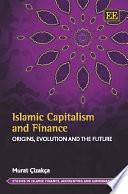
Islamic Economics and Finance
A European Perspective
In June 2010 IE Business School, with King Abdulaziz University, gathered in Madrid some of the world's foremost scholars, academics and practitioners of Islamic Economics and Finance. These highlights of the symposium and original articles specifically address the post-crisis application of this growing and relevant economic philosophy in Europe.
- ISBN 13 : 0230361137
- ISBN 10 : 9780230361133
- Judul : Islamic Economics and Finance
- Sub Judul : A European Perspective
- Pengarang : J. Langton, C. Trullols, A. Turkistani, C. Trullols, A. Turkistani, C. Trullols, A. Turkistani,
- Kategori : Business & Economics
- Penerbit : Springer
- Bahasa : en
- Tahun : 2011
- Halaman : 191
- Google Book : https://play.google.com/store/books/details?id=RbNhAQAAQBAJ&source=gbs_api
-
Ketersediaan :
In June 2010 IE Business School, with King Abdulaziz University, gathered in Madrid some of the world's foremost scholars, academics and practitioners of Islamic Economics and Finance.








